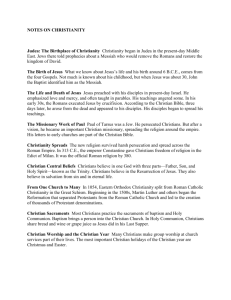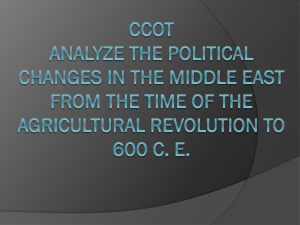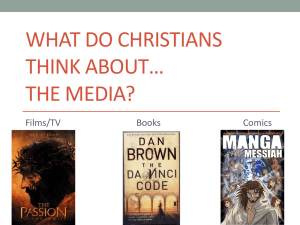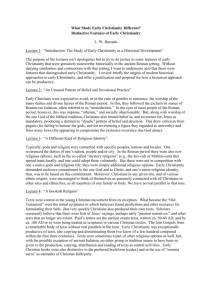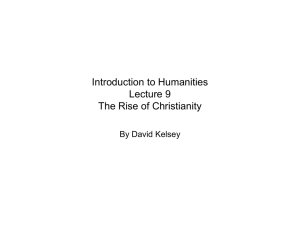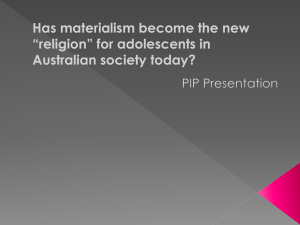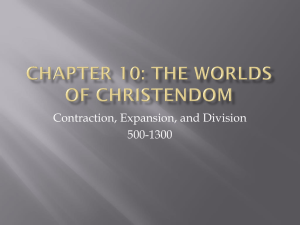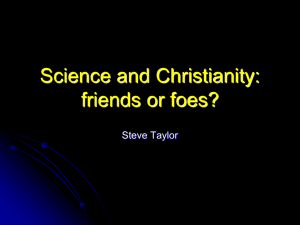Arguments 3 and 4
advertisement
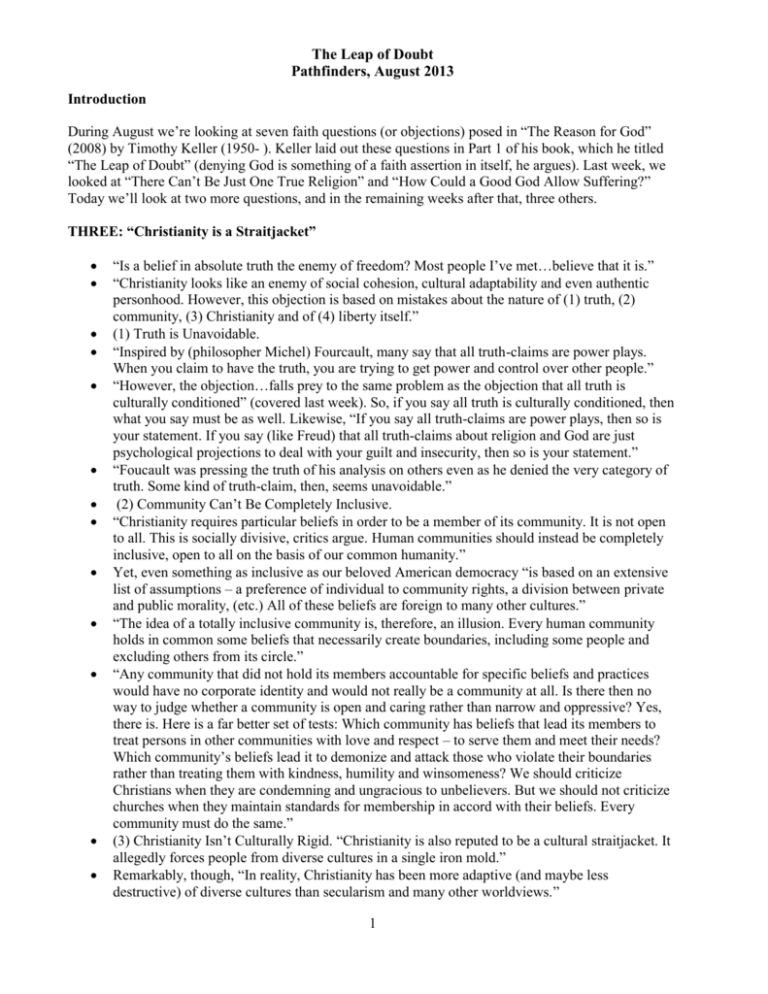
The Leap of Doubt Pathfinders, August 2013 Introduction During August we’re looking at seven faith questions (or objections) posed in “The Reason for God” (2008) by Timothy Keller (1950- ). Keller laid out these questions in Part 1 of his book, which he titled “The Leap of Doubt” (denying God is something of a faith assertion in itself, he argues). Last week, we looked at “There Can’t Be Just One True Religion” and “How Could a Good God Allow Suffering?” Today we’ll look at two more questions, and in the remaining weeks after that, three others. THREE: “Christianity is a Straitjacket” “Is a belief in absolute truth the enemy of freedom? Most people I’ve met…believe that it is.” “Christianity looks like an enemy of social cohesion, cultural adaptability and even authentic personhood. However, this objection is based on mistakes about the nature of (1) truth, (2) community, (3) Christianity and of (4) liberty itself.” (1) Truth is Unavoidable. “Inspired by (philosopher Michel) Fourcault, many say that all truth-claims are power plays. When you claim to have the truth, you are trying to get power and control over other people.” “However, the objection…falls prey to the same problem as the objection that all truth is culturally conditioned” (covered last week). So, if you say all truth is culturally conditioned, then what you say must be as well. Likewise, “If you say all truth-claims are power plays, then so is your statement. If you say (like Freud) that all truth-claims about religion and God are just psychological projections to deal with your guilt and insecurity, then so is your statement.” “Foucault was pressing the truth of his analysis on others even as he denied the very category of truth. Some kind of truth-claim, then, seems unavoidable.” (2) Community Can’t Be Completely Inclusive. “Christianity requires particular beliefs in order to be a member of its community. It is not open to all. This is socially divisive, critics argue. Human communities should instead be completely inclusive, open to all on the basis of our common humanity.” Yet, even something as inclusive as our beloved American democracy “is based on an extensive list of assumptions – a preference of individual to community rights, a division between private and public morality, (etc.) All of these beliefs are foreign to many other cultures.” “The idea of a totally inclusive community is, therefore, an illusion. Every human community holds in common some beliefs that necessarily create boundaries, including some people and excluding others from its circle.” “Any community that did not hold its members accountable for specific beliefs and practices would have no corporate identity and would not really be a community at all. Is there then no way to judge whether a community is open and caring rather than narrow and oppressive? Yes, there is. Here is a far better set of tests: Which community has beliefs that lead its members to treat persons in other communities with love and respect – to serve them and meet their needs? Which community’s beliefs lead it to demonize and attack those who violate their boundaries rather than treating them with kindness, humility and winsomeness? We should criticize Christians when they are condemning and ungracious to unbelievers. But we should not criticize churches when they maintain standards for membership in accord with their beliefs. Every community must do the same.” (3) Christianity Isn’t Culturally Rigid. “Christianity is also reputed to be a cultural straitjacket. It allegedly forces people from diverse cultures in a single iron mold.” Remarkably, though, “In reality, Christianity has been more adaptive (and maybe less destructive) of diverse cultures than secularism and many other worldviews.” 1 The Leap of Doubt Pathfinders, August 2013 “The pattern of Christian expansion differs from that of every other world religion:” First, the Jews; Hellenists; Europeans and North Americans; and now Africa, Latin America and Asia. “Why has Christianity grown so explosively in these places?...(Because) it has adapted significantly and positively to the surrounding culture without compromising its main tenets.” “There is, of course, a core of teachings (the Apostle’s Creed, the Lord’s Prayer, the Ten Commandments) to which all forms of Christianity are committed. Nevertheless, there is a great deal of freedom in how these absolutes are expressed and taken from within a particular culture.” It is truly a two-way street: “While every culture has distortions and elements that will be critiqued and revised by the Christian message, each culture will also have good and unique elements to which Christianity connects and adapts.” “Contrary to popular opinion, then, Christianity is not a Western religion that destroys local cultures. Rather, Christianity has taken more culturally diverse forms than other faiths.” (4A) Freedom Isn’t Simple. “Christianity is supposedly a limit to personal growth and potential because it constrains our freedom to choose our own beliefs and practices….This resistance to authority in moral matters is now a deep current in our culture….(However), freedom cannot be defined in strictly negative terms, as the absence of confinement and constraint. In fact, in many cases, confinement and constraint is actually a means to liberation.” Music for instance. It takes hours of practice at the sacrifice of a great deal of personal freedom. Yet, the musician then accomplishes and unleashes a greater, richer type of personal fulfillment. “This does not mean that restriction, discipline and constraint are intrinsically, automatically liberating….In our society many people have worked extremely hard to pursue careers that pay well rather than fit their talents and interests. Such careers are straitjackets that in the long run stifle and dehumanize us.” “Disciplines and constraints, then, liberate us only when they fit with the reality of our nature and capacities….In many areas of life, freedom is not so much the absence of restrictions as finding the right ones, the liberating restrictions. “If we only grow intellectually, vocationally and physically through judicious constraints – why would it not also be true for spiritual and moral growth? Instead of insisting on freedom to create spiritual reality, shouldn’t we be seeking to discover it and disciplining ourselves to live according to it? The popular concept – that we should each determine our own morality – is based on the belief that the spiritual realm is nothing at all like the rest of the world. Does anyone really believe that?” (4B) Love, the Ultimate Freedom, is More Constraining Than We Might Think. “What then is the moral-spiritual reality we must acknowledge to thrive? What is the environment that liberates us if we confine ourselves to it, like water liberates fish? Love. Love is the most liberating freedom-loss of all.” “One of the principles of love – either love for a friend or romantic love – is that you have to lose independence to attain grater intimacy….Again we are confronted with the complexity of the concept of ‘freedom.’ Human beings are most free and alive in relationships of love. We only become ourselves in love, and yet healthy love relationships involve mutual, unselfish service, a mutual loss of independence.” At first sight, then, a relationship with God seems inherently dehumanizing. Surely it will have to ‘one way,’ God’s way. God, the divine being, has all the power. I must adjust to God – there is no way that God could adjust to and serve me….While this may be true in other forms of religion and belief in God, it is not true in Christianity. In the most radical way, God has adjusted to us – in his incarnation and atonement.” 2 The Leap of Doubt Pathfinders, August 2013 “When you fall in love, you want to please the beloved….For a Christian, it’s the same with Jesus. The love of Christ constrains. Once you realize how Jesus changed for you and gave himself for you, you aren’t afraid of giving up your freedom and…finding your freedom in him.” FOUR: “The Church is Responsible for So Much Injustice.” “Many people who take an intellectual stand against Christianity do so against a background of personal disappointment with Christians and churches….So we have to address the behavior of Christians – individual and corporate – that has undermined the plausibility of Christianity for many people. Three issues stand out. First, there is the issue of Christians’ glaring character flaws….Second, there is the issue of war and violence….(Third,) there is the issue of fanaticism.” (1) Character Flaws. “Church communities seem, if anything, to be characterized by more fighting and party spirit than do other voluntary organizations.” Yikes! He’s on to us! At the same time, many irreligious people live morally exemplary lives. “Shouldn’t Christians on the whole be much better people than everyone else?” “This assumption is based on a mistaken belief concerning what Christianity actually teaches about itself. Christian theology has taught what is known as common grace.” That is, all acts of good performed by anybody are unmerited gifts of God, who distributes them across humanity. “Christian theology also speaks of the seriously flawed character of real Christians….Growth in character and changes in behavior occur in a gradual process….As the saying has it: ‘The church is a hospital for sinners, not a museum for saints.’” It is also helpful to remember the starting place of many Christians. Many are emerging from really tragic situations – that’s how they often come to know their need for God. Why wouldn’t such a person compare poorly with a (nonreligious) person raised in healthy circumstances? (2) Religion and Violence. “Religion ‘transcendentalizes’ ordinary cultural differences so that parties feel they are in a cosmic battle between good and evil….Evidence seems to indicate that religion aggravates human differences until they boil over into war, violence and (etc.)” There are problems with this, however. Communist regimes, for instance, rejected belief in God. “These societies were all rational and secular, yet each produced massive violence against its own people without the influence of religion. Why? Alister McGrath points out that when the idea of God is gone, a society will ‘transcendentalize’ something else, some other concept, in order to appear morally and spiritually superior” (Communists: The State; French Rev.: Liberty). “Violence done in the name of Christianity is a terrible reality and must be both addressed and redressed. There is no excusing it. In the 20th century, however, violence has been inspired as much by secularism as by moral absolutism. Societies that have rid themselves of all religion have been just as oppressive as those steeped in it.” (3) Fanaticism. A major turnoff: “Many nonbelievers have friends or relatives who have become ‘born again’ and seem to have gone off the deep end.” “Many people try to understand Christians along a spectrum from ‘nominalism’ at one end to ‘fanaticism’ on the other….In this schematic, the best kind of Christian would be someone in the middle, someone who doesn’t go all the way it, who believes it but is not too devoted to it. The problem with this approach is that it assumes that Christian faith is basically a form of moral improvement. Intense Christians would there be intense moralists….This leads naturally to feelings of superiority…and from there to various forms of abuse.” (Fanatics in a word!) “What if, however, the essence of Christianity is salvation by grace, salvation not because of what we do but because of what Christ has done for us? Belief that you are accepted by God by sheer grace is profoundly humbling. The people who are fanatics, then, are so not because they are too committed to the gospel but because they’re not committed to it enough.” 3 The Leap of Doubt Pathfinders, August 2013 The Bible, in fact, is actually rather critical of religious fanaticism itself. “Fanaticism...(is) a constant danger within any body of religious believers. For Christians, however, the antidote is not to tone down and moderate their faith, but rather to grasp a full and truer faith in Christ.” Several Old Testament prophets judged the religion of their day as an instrument of oppression – 3,000 years before Karl Marx. Jesus himself, in the Sermon on the Mount, does not criticize irreligious people – but rather religious ones! “What were the prophets and Jesus criticizing? They were not against prayer and fasting and obedience to Biblical directions for life. The tendency of religious people, however, is to use spiritual and ethical observance as a lever to gain power over others and over God, appeasing him through ritual and good works.” “The God of Jesus and the prophets, however, saves completely by grace. He cannot be manipulated by religious performance – he can only be reached through repentance, through the giving up of power. If we are saved by sheer grace we can only become grateful, willing servants of God and of everyone around us.” “In Jesus’ and the prophets’ critique, self-righteous religion is always marked by insensitively to issues of social justice, while true faith is marked by profound concern for the poor and marginalized. The Swiss theologian John Calvin, in his commentaries on the Hebrew prophets (Habbakuk 2:6), says that God so identifies with the poor that their cries express divine pain. The Bible teaches us that our treatment of them equals our treatment of God.” “While the church has inexcusably been party to the oppression of people at times, it is important to realize that the Bible gives us tools for analysis and unflinching critique of religiously supported injustice from within the faith. Historian C. John Sommerville claims that even strong secular critics of Christianity are really using resources from within it to denounce it….(Thus,) the shortcomings of the church can be understood historically as the imperfect adoption and practice of the principles of the Christian gospel….(And,) to give up Christian standards would be to leave us with no basis for the criticism.” “The answer is (that)…we should move to a fuller and deeper grasp of what Christianity is. The Bible itself has taught us to expect the abuses of religion and it has also told us what to do about them. Because of this, Christian history gives us many remarkable examples of self-correction.” Keller then devotes the last six pages of the chapter to five examples of “Justice in Jesus’ Name.” (1) Fighting African slave trading in Great Britain (William Wilberforce, Member of Parliament from 1780-1825) and in America (John Woolman, a Quaker preacher, b.1720-d.1772). (2) Mid-20th Century Civil Rights Movement – Martin Luther King, Jr. (b.1929-d.1968). (3) South African apartheid – Desmond Tutu (b.1931- ). (4) Communist dictatorship in Poland, Soviet domination (Jerzy Popieluszko, b.1947-d.1984, and Lech Walesa, b.1943 - ). (5) Fighting Nazis: Dietrich Bonhoeffer, b.1906-d.1945). “When people have done injustice in the name of Christ they are not being true to the spirit of the one who himself died as a victim of injustice and who called for the forgiveness of his enemies. When people give their lives to liberate others as Jesus did, they are realizing the true Christianity that Martin Luther King, Jr., Dietrich Bonhoeffer and other Christian voices have called for. Coming Weeks Aug. 25: “How Can…God Send People to Hell?” and “Science Has Disproved Christianity.” Sept. 1: “You Can’t Take the Bible Literally.” -####4

